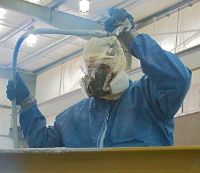Fireproofing for an EV Battery
EV Battery Technology
Electric or hybrid-electric vehicle battery technology continues to advance, but it also presents production challenges related to application and cost and overall life cycle durability and safety concerns. In battery fireproofing applications, transfer tapes or similar separating materials are adhered to components to create a fire-retardant barrier, and protect cells, the assembly and the battery from heat and fire. However, this method leads to high manufacturing costs, due to the manual application labour process and the increased inventory of different custom-sized pads and can be susceptible to weak bonds.
2K Fireproofing Materials
Material suppliers have developed new fireproofing materials to replace the traditional protection methods. Instead, a new process featuring two-component spraying is adopted. By using an automated fireproofing coating process, such materials have stronger adhesion and also have many advantages, making them more recognised in the lithium battery industry:
- Automated applications
- Reduced cost
- Improved battery safety
- Enhanced battery performance
Mixing and Delivering High Solid Two-Component Materials
Given some characteristics of the two-component fireproofing materials and the special requirements of the spraying process in the automotive industry, the technique for spraying the fireproofing material onto lithium battery components has become an urgent problem to be solved. Graco’s XM PFP plural-component equipment provides a unique solution for spraying fireproofing materials onto lithium batteries, which solves a number of problems for customers.
- XM PFP feeds materials through a platen specially designed for the continuous delivery of high viscosity materials.
- The mixing ratio of A/B material is adjusted electronically, which ensures that the error does not exceed ±5%.
- Heating with high-flow powerful heaters may ensure that materials A and B are mixed at the most suitable temperature to achieve the best mixing effect.
Matching the Automated Production Line
The production of electric and electric-hybrid vehicles is block-based integration with the production line, and automated spraying of fireproofing materials must also be integrated with the production line. These high automation spraying equipment requirements need to meet the conditions for PLC control but must also have an extremely low equipment failure rate.
Under such requirements, Graco XM PFP plural-component spraying equipment has become the best choice. The PLC control, communication gateway module and XM automatic switching valve, or the automatic spray gun, form a complete set of automated spraying equipment, perfectly meeting the spraying requirements on the production line.
Reliable Graco Spray Equipment
The high-pressure airless spraying process brings an excellent atomisation effect, ensuring light, thin and firm coating for high quality and reliable results. Graco XM PFP plural-component sprayers offer data reporting technology to ensure that fireproofing coatings are sprayed on-ratio and in line with the application requirements. The spaying equipment is easy to use, maintains consistent temperature control, provides full ratio assurance and process monitoring. Have confidence in your coating with Graco equipment.
Are you currently designing your battery pack or looking for spray equipment solutions to protect your battery pack? We can help. Contact our team of experts today.
Contact an Expert
Related Articles
Thermal Management Benefits for EV Battery
Thermal management is critical for electric vehicle battery packs and requires durable dispensing equipment to withstand demanding application challenges.
Case Study: Li-ion Battery Manufacturing
An EV battery manufacturer had to determine the best foam encapsulation process for a new cell module design. Quick collaboration with Graco put it into production by a critical deadline.
Battery Pack Seal – EV Battery
A quality seal is critical for the performance and longevity of EV batteries and for protecting integral components from water intrusion and other harsh environmental conditions.




